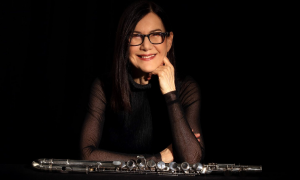Home » Jazz Articles » Interview » Ron McClure: Lookout Farms and New Moons
Ron McClure: Lookout Farms and New Moons

Charles Lloyd
saxophoneb.1938

Dave Liebman
saxophoneb.1946

Richie Beirach
pianob.1947

Jeff Williams
drums
All About Jazz: How did you get started in music?
Ron McClure: I grew up in New Haven, Connecticut and played music from the time I was five years old. I played accordion, a little piano and bass. A teacher from high school basically talked me into following my dream and going into music as a career. I don't push my students now but I do tell them to think about their lives when they're 40 and what it would be like then to have not done what you wanted to do. I went to the Hartt School in Hartford, Connecticut. My private teacher Eddie Miller had been teaching me about jazz harmony. I remember that the school did not really encourage jazz—once, when I was playing in a room with Houston Person, who was also a student there, we were reported for playing that "evil body music." But I had been listening to jazz since I was a kid and that's what I wanted to play. I was a bass major at Hartt and while I was still there I met musicians who came to Hartford to play—people like [vibraphonist] 
Mike Mainieri
vibraphone
b.1938
Maynard Ferguson
trumpet
1928 - 2006
AAJ: Tell me a little about your time with Ferguson.
RM: There were good arrangements by people like Willie Maiden and 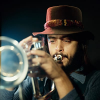
Chuck Mangione
flugelhorn
1940 - 2025
Wynton Kelly
piano
1931 - 1971
Wes Montgomery
guitar
1923 - 1968
AAJ: That was the Smokin' at the Half Note (Verve, 1965) group with 
Paul Chambers
bass, acoustic
1935 - 1969
Jimmy Cobb
drums
1929 - 2020
RM: Yeah, Maynard opened for them at a club in Atlantic City. When it came time for them to play one night they couldn't find Paul. He was not so well then—in fact it was shortly before he died. I'd met Paul before and all he could say to me then was "You're the cat, man." Anyway, the music that Wynton and Wes did was joyous and truly timeless. Talk about a time feel and a groove! Jimmy did a couple rim shots and signaled for me to come up. I knew the tunes pretty much and when I started to play, Wes just looked around at me and beamed, grinned from ear to ear. So I did the set and then about a month later, the same two groups were paired at a club in New York. 
Ron Carter
bass
b.1937
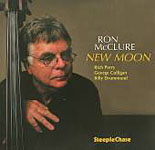 AAJ: Isn't there a story about playing with the
AAJ: Isn't there a story about playing with the 
Miles Davis
trumpet
1926 - 1991
RM: 
Herbie Hancock
piano
b.1940
Tony Williams
drums
1945 - 1997
Keith Jarrett
piano
b.1945
Jack DeJohnette
drums
b.1942
Wayne Shorter
saxophone
1933 - 2023
Joe Henderson
saxophone
1937 - 2001
AAJ: Tell me about San Francisco, The Fourth Way and Joe Henderson.
 Quest, from left: Ron McClure, Dave Liebman, Billy Hart, Richie Beirach
Quest, from left: Ron McClure, Dave Liebman, Billy Hart, Richie Beirach
RM: In 1970, I was living in San Francisco and playing with the Fourth Way. It was one of those '70s jazz/rock/alternative bands with 
Michael White
b.1954
Mike Nock
piano
b.1940
Eddie Marshall
drums
b.1938
Bobby Hutcherson
vibraphone
1941 - 2016
AAJ: Would you agree then that you're comfortable playing a wide variety of things?
RM: I take the music seriously. I played electric bass with Blood, Sweat and Tears—I got a Grammy nomination for a tune from the album New City—and later I played, with Herbie Hancock, on a Pointer Sisters album.
AAJ: What about the Charles Lloyd experience?
RM: 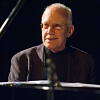
Steve Kuhn
piano
b.1938
AAJ: And the group playing at Birdland?
RM: It's the 35th anniversary of the group that [saxophonist] Dave Liebman and [pianist] Richie Beirach started—Lookout Farm. 
Frank Tusa
bass, acoustic
b.1947
Jeff Williams
drums
Eddie Gomez
bass
b.1944
George Mraz
bass
1944 - 2021
AAJ: Who are the musicians—bassists and others—who've most influenced you?
RM: I'd say Herbie Hancock would have to be at the top of the list. He can play any style and he's played with everybody. He's been part of so many of the great recordings. Then, of course, there's Bill Evans and Miles and Wayne Shorter. I learned more about music from Richie Beirach than from anyone else. He's so knowledgeable and generous with his knowledge. When you play with people like Richie or Jack DeJohnette, they're in your blood. They make you play in the here and now. For bassists, it's Paul Chambers, 
Wilbur Ware
bass, acoustic
1923 - 1979Albert Stinson
bass, acoustic
1944 - 1969
Steve Swallow
bass
b.1940
Jaco Pastorius
bass, electric
1951 - 1987
Charles Mingus
bass, acoustic
1922 - 1979
AAJ: And your latest recording for Steeplechase?
RM: It's called New Moon (SteepleChase, 2009) and has 
Rich Perry
saxophone, tenor
George Colligan
multi-instrumentalist
b.1969
Billy Drummond
drums
b.1959
Selected Discography:
Ron McClure, New Moon (SteepleChase, 2009)
Ron McClure Sextet, Double Triangle (Naxos Jazz, 1999)
Ron McClure, Tonite Only (SteepleChase, 1991)
Quest, Midpoint: Live at Montmartre (Quest III) (Storyville, 1987)
The Fourth Way, The Sun and the Moon Have Come Together (Harvest, 1969)
Charles Lloyd, Soundtrack (Atlantic-Rhino, 1968)
Photo Credits
Page 1: Courtesy of The Bird's Eye Jazz Club
Page 2: Courtesy of Dave Liebman
Tags
Comments
PREVIOUS / NEXT
Support All About Jazz
 All About Jazz has been a pillar of jazz since 1995, championing it as an art form and, more importantly, supporting the musicians who make it. Our enduring commitment has made "AAJ" one of the most culturally important websites of its kind, read by hundreds of thousands of fans, musicians and industry figures every month.
All About Jazz has been a pillar of jazz since 1995, championing it as an art form and, more importantly, supporting the musicians who make it. Our enduring commitment has made "AAJ" one of the most culturally important websites of its kind, read by hundreds of thousands of fans, musicians and industry figures every month.
Go Ad Free!
To maintain our platform while developing new means to foster jazz discovery and connectivity, we need your help. You can become a sustaining member for as little as $20 and in return, we'll immediately hide those pesky ads plus provide access to future articles for a full year. This winning combination vastly improves your AAJ experience and allow us to vigorously build on the pioneering work we first started in 1995. So enjoy an ad-free AAJ experience and help us remain a positive beacon for jazz by making a donation today.

New York City
Concert Guide | Venue Guide | Local Businesses
| More...


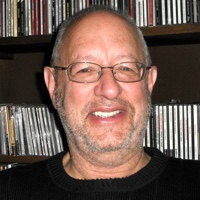




 Buy Now
Buy Now









